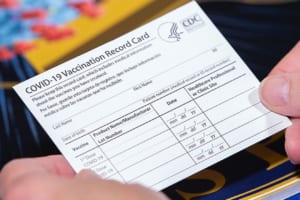A proxy marriage and an online marriage are distinct types of marital arrangements that cater to different needs and circumstances. For immigration purposes, there are unique differences which between the two that if not properly addressed, could result in either a denial by the United States Citizenship and Immigration Services (“USCIS”) or a refusal by the U.S. Department of State (“DOS”).
A proxy marriage is a ceremony where one or both of the parties are not physically present and are represented by somebody else (a proxy) during the ceremony. The legality of proxy marriages varies by U.S. state or jurisdiction as some states allow the marriage under certain circumstances (i.e. military personnel stationed abroad) while others do not. For immigration purposes, neither USCIS or DOS recognize the validity of a proxy marriage unless the marriage is consummated at any time following the ceremony.
An online marriage involves the parties participating in the wedding ceremony via the internet, often through video conferencing platforms (i.e. Zoom). Specifically, the State of Utah has emerged as a national leader in online marriages since the legislature enacted a law allowing parties to participate in the wedding ceremony without being physically present in Utah, provided the marriage officiant is solemnizing the marriage within the state.
In situations where the parties are physically separate during the online marriage ceremony, it is considered a proxy marriage in which the marriage is not valid for immigration purposes until the marriage is consummated. If the parties are physically together during the ceremony, the marriage is immediately valid for immigration purposes and proof of consummation is not required before filing for an immigration benefit with either USCIS or DOS.
For more information on online marriages and how they can be used to avail of U.S. immigration benefits, contact us at info@enterlinepartners.com.
ENTERLINE & PARTNERS CONSULTING
Ho Chi Minh City, Vietnam Office
146C7 Nguyen Van Huong St, Thao Dien Ward,
District 2, Thu Duc City
Ho Chi Minh City, Vietnam
Tel: +84 933 301 488
Email: info@enterlinepartners.com
Facebook: Enterline & Partners – Dịch vụ Thị thực và Định cư Hoa Kỳ
YouTube: @EnterlineAndPartnersConsulting
Website: http://enterlinepartners.com
Manila, Philippines Office
Tel: +63 917 543 7926
Email: info@enterlinepartners.com
Facebook: Enterline and Partners Philippines
Website: https://enterlinepartners.com/language/en/welcome/
Copyright 2024. This article is for information purposes only and does not constitute legal advice. This article may be changed with or without notice. The opinions expressed in this article are those of Enterline and Partners only.








